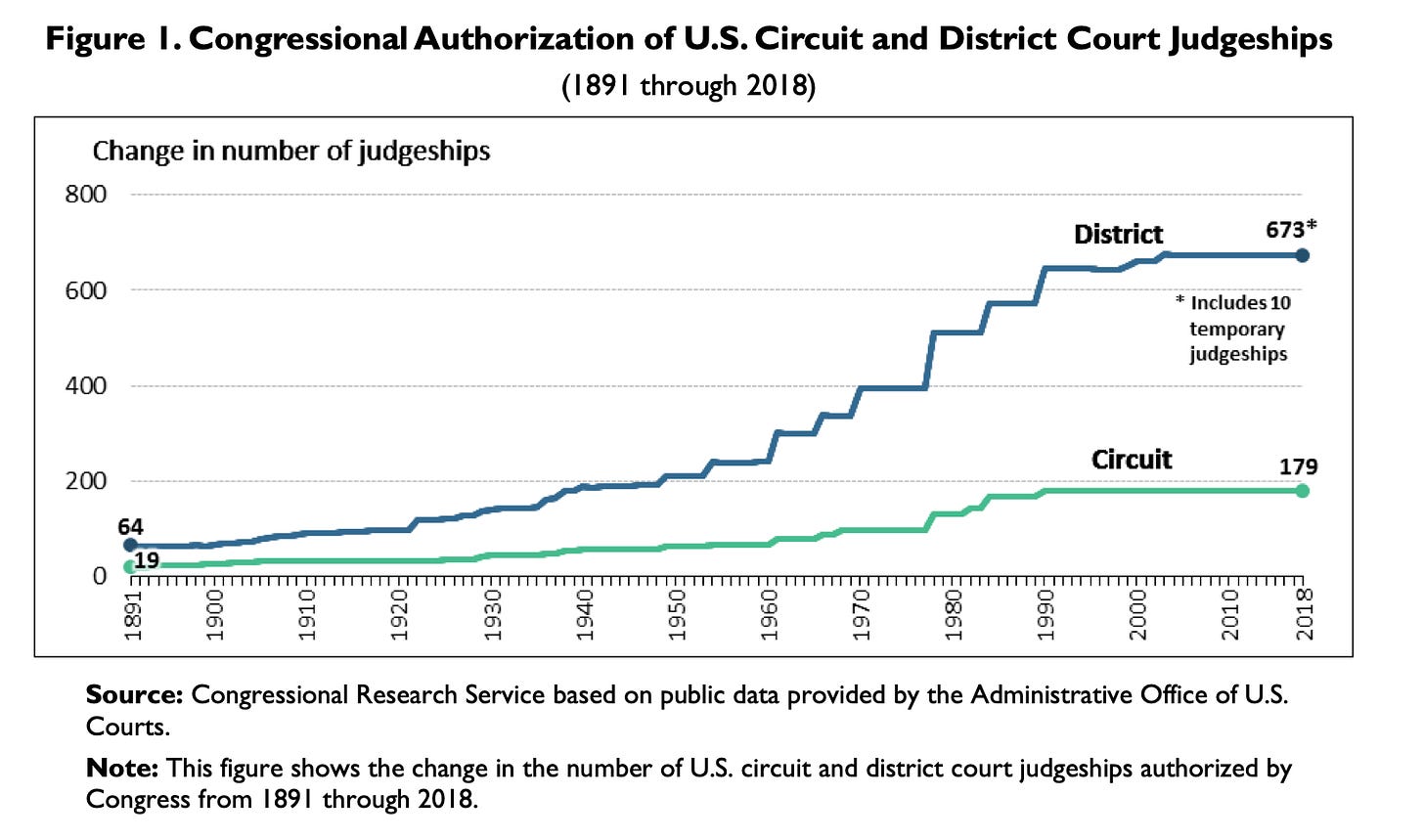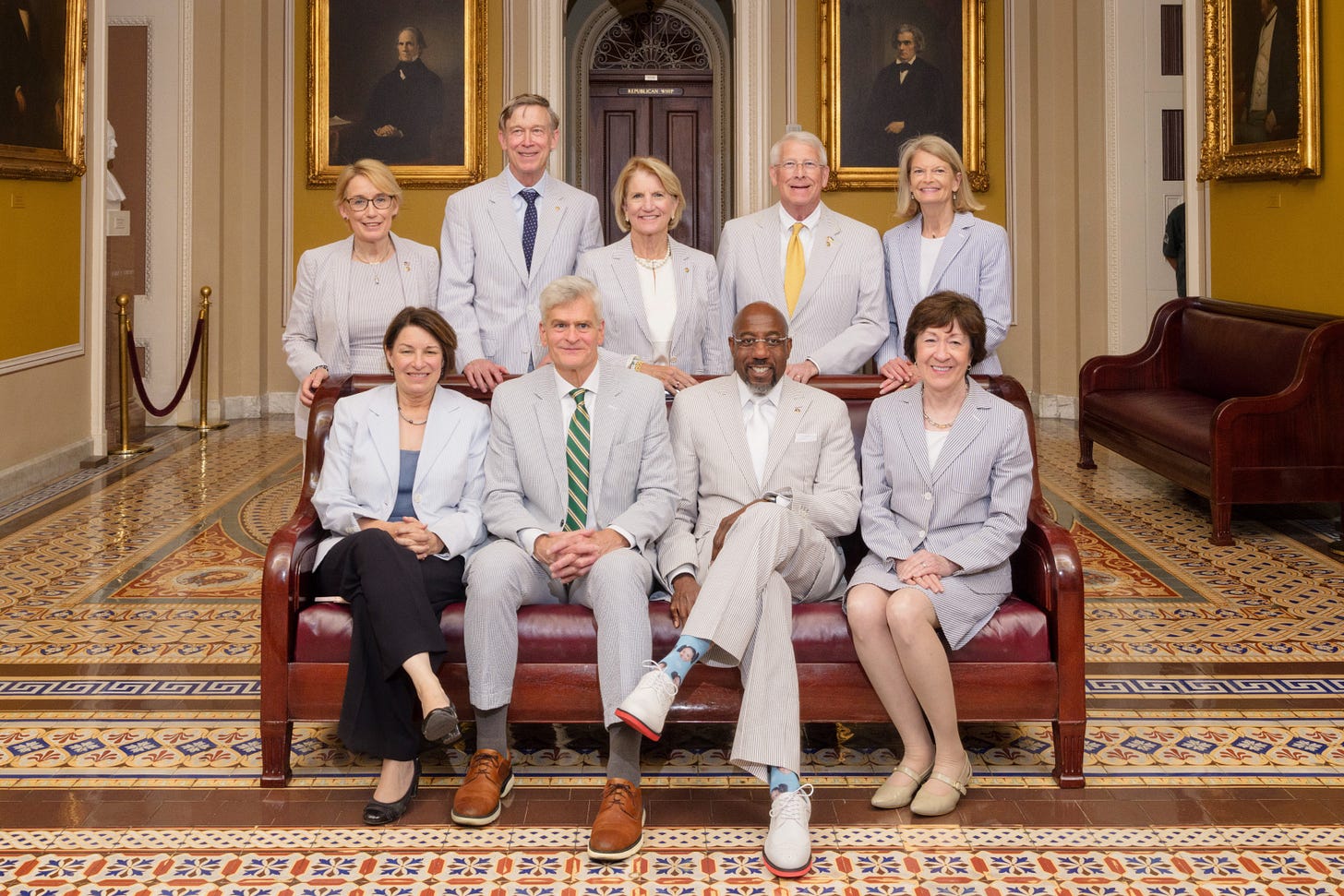Eight things you missed that Congress did this week
Even a bipartisan court reform bill?
Good morning! It’s Friday, June 14, 2024. Election Day is 144 days away. Today is Flag Day, the 247th anniversary of the adoption of the American flag by the Continental Congress. 🇺🇸
Before we dive into today’s newsletter, I have to thank you all for an amazing Day 1 at Substack. I’m so grateful to everyone who signed up for a paid subscription and for all your very kind and supportive notes. I couldn’t be more excited for what the future has in store.
If you haven’t yet upgraded, you can click to do so here:
What kind of journalism will you be supporting when you sign up for a paid subscription? Pieces like the one below, which try to highlight the positive developments here in Washington (yes, they exist!), not just the doom and gloom. As I wrote yesterday, I think these in-the-weeds stories are critically important — and sorely under-covered in the media landscape today. Today’s newsletter is a perfect proof of concept for what this type of solutions-based journalism can look like.
While reading it, if you find yourself learning something new about our government that you didn’t know before, I hope you’ll consider creating a paid subscription or sharing the newsletter with your friends and family. (Also, if you have any questions or if the move to Substack has caused issues in your inbox, ping me at gabe@wakeuptopolitics.com. Current monthly donors on PayPal, and those who have donated the amount of a paid subscription in the last year, should have been comped a paid subscription on Substack. If that went to the wrong email for you, reach out and I can fix it.)
Thanks again for all your support — you all are truly the best. Now, enough preamble. Let’s dive in!
It’s June, which means the Supreme Court is about to reassert itself at the center of American politics. Major opinions on gun rights, presidential immunity, emergency abortions, regulatory power, and more are expected to be released in the coming days; the justices ruled Thursday in a closely watched case on mifepristone access, which was upheld.
In addition to arguments about the cases at hand, this annual summer ritual reliably leads to a fair amount of partisan bickering over the judiciary itself. In the past few years, Democrats have increasingly rallied behind proposals to pack the Supreme Court or impose a code of ethics on the justices; Republicans have generally opposed these efforts.1 Recent revelations about Clarence Thomas’ private jet trips and Martha-Ann Alito’s passion for vexillology have only made these clashes more divisive.
So, with that backdrop, would you be surprised if I told you that a bipartisan judicial reform bill sailed through a Senate committee this week?
No, the bill won’t impact the makeup of the Supreme Court — but remember that the vast majority of cases never make it up to SCOTUS. Upwards of 400,000 cases are filed in the federal district courts each year; of those, around 70 (or 0.02%) will be argued before the justices. Less than 10% will even make it to the federal appeals courts, which means the district courts are the last point of access for most litigants. The district courts are where civil and criminal trials are held; critically, they are also where evidentiary records are established.
And yet, despite their importance for the judicial system, federal district courts are really overworked. At the end of last year, there was more than 757,000 cases pending before the district courts — there are 673 federal district judges, so that comes out to more than 1,100 cases per judge, creating a serious backlog.
For most of the country’s history, Congress would regularly increase the number of district court judges to keep up with the caseload — but the number has been flat at 673 since 2003, the longest stretch since America’s founding that no new judgeships have been created. Congress hasn’t passed a comprehensive expansion of the federal court system since 1990, even though, in that time, both the U.S. population and the district court caseload have increased by more than 30% each.
The Sixth Amendment guarantees Americans the right to a speedy trial, but with so many cases and so few judges, that’s become hard to achieve. In 1995, the median interval between when a civil case was filed in a district court and when the trial was completed was 18 months. In 2018, it was 26 months. Last year, it was 35 months. If “justice delayed is justice denied,” then that’s a whole lot of denied justice.
The Judicial Conference of the United States, the administrative body for the federal judiciary, chaired by the Chief Justice, has been asking Congress for years to increase the number of judgeships, requests that have fallen on deaf ears.
Until now.
The Senate Judiciary Committee voted 20-0 this week to advance the bipartisan Judicial Understaffing Delays Getting Emergencies Solved (JUDGES) Act, which would help alleviate the country’s judicial backlog by creating 63 new district court judgeships. If enacted, it will be the first time lawmakers have agreed to comprehensively expand the judiciary in more than 30 years.
The bipartisan nature of the bill should not be ignored. Academic studies have found that, typically, federal judgeships are only added in periods of united government; if this bill continues advancing at a time when the House and Senate are controlled by opposite parties, it will be an impressive achievement. Usually, it’s difficult to attract bipartisan support for these expansions, even when they’re badly needed, for an obvious reason: the party out of power (understandably!) doesn’t want to hand the president the opportunity to name dozens of new judges overnight.
The JUDGES Act has a fix for that: the new judgeships will be created in six separate phases between now and 2035. That way, the changes will be spread out over three presidencies, increasing the chances that both parties will be able to take advantage. That might mean the impact of the bill would be slowed — but it’s also allowed the measure to advance in the first place, since, otherwise, neither party would exactly be eager to touch it.
Sen. Chuck Grassley (R-IA) is a senior member of the Judiciary Committee who has long opposed judicial expansion efforts. But, yesterday, he voted for the JUDGES Act, along with the rest of his colleagues. Grassley’s speech during the committee meeting is an interesting glimpse into how legislative change can happen, however slowly.
“If you want to know why I’ve changed my mind on it, it’s because of the collegiality of people on this committee [who were] really willing to look for some changes in the bill,” Grassley said. (The bill initially was going to create the new judgeships in two phases, but was amended to six phases.)
“While this bill isn’t perfect, and it does not have everything that I would’ve wanted, it is a much improved bill,” the Iowa Republican continued. “Given these changes and the good faith efforts of our colleagues…I’m voting for this bill.”
This is another proof point that the chemistry of Congress matters, as I’ve written previously. Functional governance requires members of Congress to work in good faith across party lines — and to both be open to modifying their proposals and to vote for measures they might not think are perfect. That’s what happened here. And, as a result, a bill that would solve a real problem in this country — and do so without advantaging either party — advanced unanimously in a Senate committee, even at a time when judicial reform efforts are often bogged down by partisanship.
“After the years of having these concerns about whether we ought to put on more judges or not,” Grassley added, “I’ve still got to say that the people of this country are entitled to justice, and justice is a speedy process, and when that’s slowed down, it’s not really justice.”
But wait, there’s more! Here are seven more examples of congressional bipartisanship that you probably didn’t hear about this week:
1. Hotel fees: The House voted 384-25 to pass the No Hidden FEES Act, which would require that hotels include any mandatory fees when advertising the price of a reservation. “Too many families have been there - you book a hotel at one price, but when you check out, you’re hit with hidden fees that cause the cost of your stay to skyrocket,” Rep. Ruben Gallego (D-AZ) said. “Today, the House finally passed my provision to crack down on this price-gouging and provide clarity and cost-saving for [families].” Polls have shown that efforts to crack down on these “junk fees” have broad bipartisan support, sparking a recent flurry of congressional action on the issue.
2. Tibet: The House passed the Promoting a Resolution to the Tibet-China Dispute Act in a 391-26 vote. The bill would update U.S. policy towards Tibet, by empowering the State Department to push for negotiations to resume between the Chinese government and the Dalai Lama. (None have taken place since 2010). While the U.S. recognizes Chinese sovereignty over Tibet, the bill would creep towards modifying that stance, by formally rejecting Chinese claims that “Tibet has been a part of China since ancient times” and allowing U.S. diplomats to “counter disinformation” from the Chinese government on that point. The bill unanimously passed the Senate last month, so it now heads to President Biden’s desk.
3. Indian boarding schools: The House Education and Workforce Committee unanimously approved the Truth and Healing Commission on Indian Boarding School Policies Act, which would create a federal body charged with investigating and documenting the history and impact of Indian boarding schools and proposing recommendations that would “promote healing” for survivors and their descendants. During the 19th and 20th centuries, hundreds of thousands of Native American children were separated from their families and forced to attend these schools, where they were often subjected to physical, emotional, and sexual abuse. The bipartisan bill was sponsored by Reps. Tom Cole (R-OK) and Sharice Davids (D-KS), two of the five Native Americans currently serving in Congress.
4. Threats against judges: Another bipartisan judicial bill! The Countering Threats and Attacks on Our Judges Act, which passed the Senate unanimously this week, would create a State Judicial Threat Intelligence and Resource Center. The new center would monitor threats against state and local judges and offer security assistance to judges and their families, including by providing physical security assessments of their courts and homes. Threats against judges have dramatically increased in recent years.
5. Gaza: A bipartisan collection of House members formed a Gaza Working Group, which will work across party lines to help chart a plan for Gaza’s future for the “day after” the Israel-Hamas war. The same House members also lead the Abraham Accords Caucus, which has helped promote the efforts that led to normalization between Israel and three Arab states (Bahrain, Morocco, and the United Arab Emirates).
6. Health care: The House Energy and Commerce Committee unanimously advanced 13 bipartisan health care bills, including measures addressing organ donation, stillbirths, autism research, Medicare and Medicaid fraud, improving health care access for non-English speakers, and mental health telehealth services.
7. Fed ethics: Sens. Rick Scott (R-FL) and Elizabeth Warren (D-MA) — two lawmakers who are about as far on opposite sides of the political spectrum as you can get — teamed up to write a letter to Federal Reserve Chair Jerome Powell on a new policy laying out the disciplinary process for Fed officials who violate the central bank’s investment trading policy. The policy change follows a scandal in which several Fed officials were found to have been engaging in stock trades that created conflicts of interest. Scott and Warren, however, label the new policy a “farce” and call on Powell to create a stricter standard.
More news to know.
USA Today: Supreme Court strikes down Trump-era ban on bump stocks for guns
NBC: Supreme Court rejects bid to restrict access to abortion pill
NYT: Trump, Back in Capitol, Has Thoughts on Taylor Swift, Nancy Pelosi and Milwaukee
CNN: Justice Clarence Thomas took more trips on GOP megadonor’s private plane than previously known
Reuters: Pentagon ran secret anti-vax campaign to undermine China during pandemic
Axios: McConnell eyes his next move
Daybook.
White House: President Biden is in Fasano, Italy for the G7 summit. Earlier this morning, he participated in working sessions of the summit and met with Italian Prime Minister Giorgia Meloni. Later today, he will meet with Pope Francis, who is making the first-ever papal appearance at a G7 summit.
Vice President Harris will travel to Atlanta, Georgia for a speech at the 100 Black Men of America, Inc. annual conference.
Congress: The Senate is done for the week. The House will vote on the annual defense policy bill.
Supreme Court: The justices released three opinions this morning, in a bankruptcy case, an immigration case, and a gun case.
Before I go…
Every Friday, when I round up official acts of congressional bipartisanship, I also like to include some lighter examples of lawmakers building comity across party lines. (It’s all about that chemistry, after all!) Here are some fun ones from this week:
Democrats and Republicans competed in the annual Congressional Baseball Game, a charity event that dates back to 1909. Continuing a four-year winning streak, Republicans wiped the floor with the Dems, 31-11.
Eight senators — five Republicans, three Democrats — participated in National Seersucker Day, another time-honored congressional tradition. Looking sharp, senators!
The bipartisan Congressional Sneaker Caucus hosted a sneaker competition. “It connects staff and members,” Rep. Jared Moskowitz (D-FL), the caucus’ founder, told Roll Call. “It gets people in the room, breaks down all the walls — whether that’s party, gender or race. Everyone can connect around the same thing.”
Rep. Marie Gluesenkamp Perez (D-WA), a former mechanic, helped fix Rep. Virgnia Foxx’s (R-NC) car radio.
One interesting point of bipartisan agreement in this area has been on the need to curb “judge shopping,” the practice of litigants filing their cases to ensure a specific judge will receive them. The two parties disagree on the solution — but, as I’ve noted in the Friday column previously, both Chuck Schumer and Mitch McConnell have introduced bills to address the problem, a notable development in its own right.






I’ve been a subscriber for YEARS, and couldn’t be happier for you! I found you when I moved to Missouri and you helped me unravel the governmental complexities of Missouri. Now you can help me with the entire country! Wishing nothing but the best for you, Gabe, you deserve it.
Congratulations on your launch on Substack, and please!!! Don't use generative AI to "create" a visual for your newsletter! Generative AI devalues the work of creatives everywhere. All those models have been trained on large amounts of copyrighted work by artists who were never asked for permission and are not being paid for their creation, even symbolically.
If you want a nice visual and you are on a budget, try the photos at Unsplash. These are posted by real photographers who are often willing to allow free use if you follow their license terms, for instance, acknowledging their authorship.
Generative AI companies are copying your newsletter as well. You will only be compensated for this use of your creation if Substack has a deal with each AI company, gets paid, and passes down to you some piece of what they get.